
During the annual Conference on Humanitarian Demining in Ukraine–2024 (UMAC-2024), partner countries announced nearly $70 million in additional commitments to support humanitarian demining. Luxembourg, the Netherlands, Norway, and Canada pledged additional funding. Since 2022, the total contribution from international partners has reached $1.07 billion.
“We greatly appreciate the contributions made by our partners to humanitarian demining in Ukraine. This is not just about equipment, funds, or projects – it’s about saving lives in Ukraine and restoring global food security. Thanks to this consistent support, we have already made significant progress in demining. A year ago, we met with partners at a demining forum in Zagreb, Croatia. At the time, we had 18 operators, around 3,000 deminers, and 32 demining machines. Today, 58 operators have been certified, the number of deminers has increased to over 4,000, and 98 demining machines are in operation,” said Yuliia Svyrydenko, First Deputy Prime Minister of Ukraine and Minister of Economy.
Luxembourg allocated $13 million for humanitarian demining projects in Ukraine. These funds will go to projects implemented by the United Nations Development Programme (UNDP) ($10.8 million), the international organization HALO Trust ($1.08 million), and through the EU Civil Protection Mechanism ($1.08 million).
Norway also announced additional funding for demining in Ukraine. The country will allocate $20 million for 2025, increasing its total contribution to $70 million. Norway’s efforts are focused on funding field operations, supporting affected communities, and strengthening demining capabilities.
The Netherlands, which has already contributed over $40 million to humanitarian demining in Ukraine, announced an additional $10.8 million for projects in 2025.
Canada will provide $24.5 million for humanitarian demining needs in Ukraine, bringing its total contribution to over $50 million.
The government of Latvia allocated over €270,000 for humanitarian demining in Ukraine. These funds will go to HALO Trust, whose specialists are working to clear land in several regions of Ukraine affected by military operations.
Switzerland, the host country of UMAC-2024, announced plans to deliver three heavy GCS-200 demining machines to the State Emergency Service of Ukraine (SES). The symbolic handover of the first machine took place during the conference. Switzerland also committed to providing 30 million Swiss francs to one of the projects of the Swiss Foundation for Mine Action (FSD), which operates in Ukraine. This funding is part of a previously announced assistance package worth 100 million Swiss francs.
The governments of Switzerland and the United Kingdom are ready to fund a pilot project for prioritizing humanitarian demining efforts. The system, based on a platform from the tech giant Palantir, will use large-scale data to determine priority areas for demining. The pilot project in Kharkiv region will last for three months.
The U.S., which announced $102 million in humanitarian demining assistance in September, introduced an initiative at the conference aimed at increasing the capacity of private demining operators. They plan to assess the needs of Ukrainian operators and strengthen their knowledge of how international donor organizations work, which will help these operators attract future international support. The first step in this direction could be strengthening cooperation between Ukrainian and international operators.
A final document supporting humanitarian demining in Ukraine was signed by 42 countries. One of its key points is that demining efforts should remain on the international agenda. The signatories committed to minimizing the impact of mines and war remnants on people’s lives through demining operations and the development of innovative technologies.
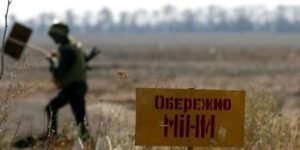
I. Representation:
II. Financial Commitments:
During UMAC-2024, partner countries announced additional commitments for humanitarian demining, amounting to nearly $70 million. Since 2022, the total partner contribution to humanitarian demining has reached $1.07 billion.
III. Additional Agreements:
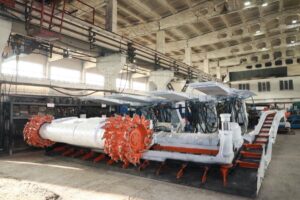
Metinvest Group’s KAMETSTAL plant, which was set up at the facilities of Dnipro Metallurgical Plant (DMK, Kamenskoye, Dnipro Oblast), increased production of long products in September this year.
“In September, Kametstal shipped more than 4 thousand tons of SVP-27 long sections to Pokrovsk miners. Thus, for the first time, the rolling shop team has reached stable industrial production volumes of products mastered as part of Metinvest’s program to restore the partially lost product mix that was previously produced at Mariupol’s steel mills,” the company said.
It is also recalled that the production of SVP-27 longitudinal shaped sections was first mastered in Ukraine at Kametstal’s pipe billet mill. The so-called mine support is designed to secure mine workings in mines and is an essential element in coal mining technology. The new rolled products have passed certification tests that confirmed their compliance with the requirements of the state standard.
It is also noted that since the commissioning, during which SVP-27 was rolled in carloads of 200-500 tons per month, the rollers have done a lot of work, which resulted in an increase in production to 2 thousand tons per month in the summer of 2024, and in September, for the first time, more than 4 thousand tons of this marginal product were manufactured and shipped to consumers.
In particular, the company purchased additional improved dock fittings that were installed at the pipe billeting mill, while specialists modified and improved the existing equipment.
In addition, a straightening machine designed to bring rolled metal products into compliance with regulatory requirements for profile straightness was refurbished in an adjacent area. The parameters of the machine have been worked out and adjusted to work with this complex profile, which has an order length of 7-9 meters.
Artem Laptev, acting chief rolling operator, explained that the path from development to commercial production of such a complex profile is a systematic work of the entire rolling team in cooperation with the process control specialists, constantly improving the rolling process.
“All comments that arise in the production process are worked out and eliminated immediately. SVP-27 was developed in difficult wartime conditions, when there was a shortage of qualified personnel, and thanks to systematic training of the shop’s process and maintenance personnel, all key specialists have now mastered the skills of rolling this profile and working with the equipment. As a result, 99% of this product, which is important for the company’s coal mining enterprises, is accepted on first presentation, and additional processing at the right section, which brings the product to the required quality parameters, makes it possible to ship almost 100% of rolled SVP-27 to our customers,” stated Laptev.
“Kametstal was established on the basis of PJSC Dneprovsky Coke and Chemical Plant (DKKhZ) and the Centralized Rolling Mill of PJSC Dneprovsky Metallurgical Plant (DMK).
According to the 2020 report of Metinvest Group’s parent company, Metinvest B.V. (Netherlands) owned 100% of the shares in DCCP.
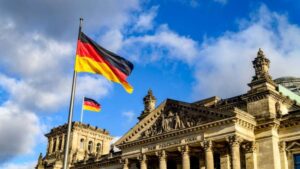
Ukrainians will soon stop receiving civilian assistance (Bürgergeld), which is intended for unemployed German citizens and amounts to EUR 563 per month, and social benefits will be reoriented in general, German Finance Minister Christian Lindner said, according to Bild.
“We should consider a separate legal status for refugees from Ukraine, Ukrainians… should not… immediately receive civilian assistance, which is focused on providing a socio-economic subsistence level and participation in society even without work,” Lindner told Wirtschaftswoche.
According to the minister, Ukrainians should receive the same benefits as other refugees. Currently, they amount to EUR 460, which is less than the Bürgergeld. According to Lindner, Ukrainians will still not have to go through the asylum procedure, but they will not automatically receive civilian assistance.
Currently, there are about 1.2 million Ukrainians in Germany. According to Bild, 65% of them receive Bürgergeld, and this share is much higher than among immigrants from other countries.
During a meeting with German Chancellor Olaf Scholz last week, Polish Foreign Minister Radoslaw Sikorski also proposed changing the mechanism of social payments to Ukrainian refugees. In an interview with TVP Info following the visit, he said that he proposed to direct the social benefits that Ukrainian refugees currently receive in Germany directly to support Ukraine.
“It’s not good that there is a financial incentive to be in Germany instead of men fighting at the front and women restoring the tax base,” said Sikorsky, who said that payments in Germany can reach EUR 1200 per month.
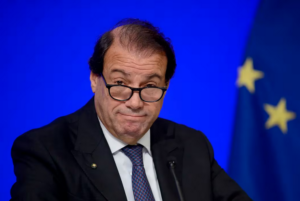
The price of Bitcoin (BTC) remained unchanged due to the event and surpassed the $68,000 mark for the first time since late July.
Italian Deputy Finance Minister Maurizio LEO said the government will raise taxes on capital gains in cryptocurrencies such as Bitcoin from 26% to 42%, Reuters and Bloomberg reported.
According to Bloomberg, the Italian cabinet made the decision because “this phenomenon is spreading,” the LEO said of Bitcoin during a conference call on Wednesday.
The move comes in the wake of Italy’s decision to strengthen its tax on digital services as part of plans to boost revenue in its 2025 budget.
The price of Bitcoin (BTC) was unchanged, posting a weekly gain of more than 12%, surpassing the $68,000 mark for the first time since late July.

From October 23 to November 15, an exposition of Nikita Tsoi’s new painting project will be presented in the hall of the Goldens auction house, in which the author denies the established, stereotypical norms of collective myth-making.
Working with the category of memory, Nikita Tsoi explores subconscious collective pain, trauma, and fears that are passed down from generation to generation. He listens closely to the stories of witnesses of past events about the past, determining their influence on the formation of stereotypical mythological consciousness, and deconstructs the worldview norms, the clichés in which the true and complex human “EGO” is embedded.
“A typical example of mythological thinking,” the artist believes, ‘is people’s ideas and fantasies about the lives of their ancestors, where the past appears picturesquely idyllic: ’it used to be better’. And, accordingly, in such fantasies there is an infantile mythologization of certain historical events.
“In my new works, I try to knock myth and romanticization out of literal reality with phantasmagoria and magical realism: I go for cynical realism under the guise of cheerful phantasmagoria, replacing everything with it and leaving a small way for the subjective memory of a person.”
The plots of the artist’s works on the borderline between reality and absurdity (“it is very difficult not to understand my painting fantasies – maybe it is actually easy,” the artist jokes) touch upon the most secret and dark corners of the human subconscious, its duality, where “each of us has his own double (doppelganger), for whom there is everything we refuse in everyday life.”
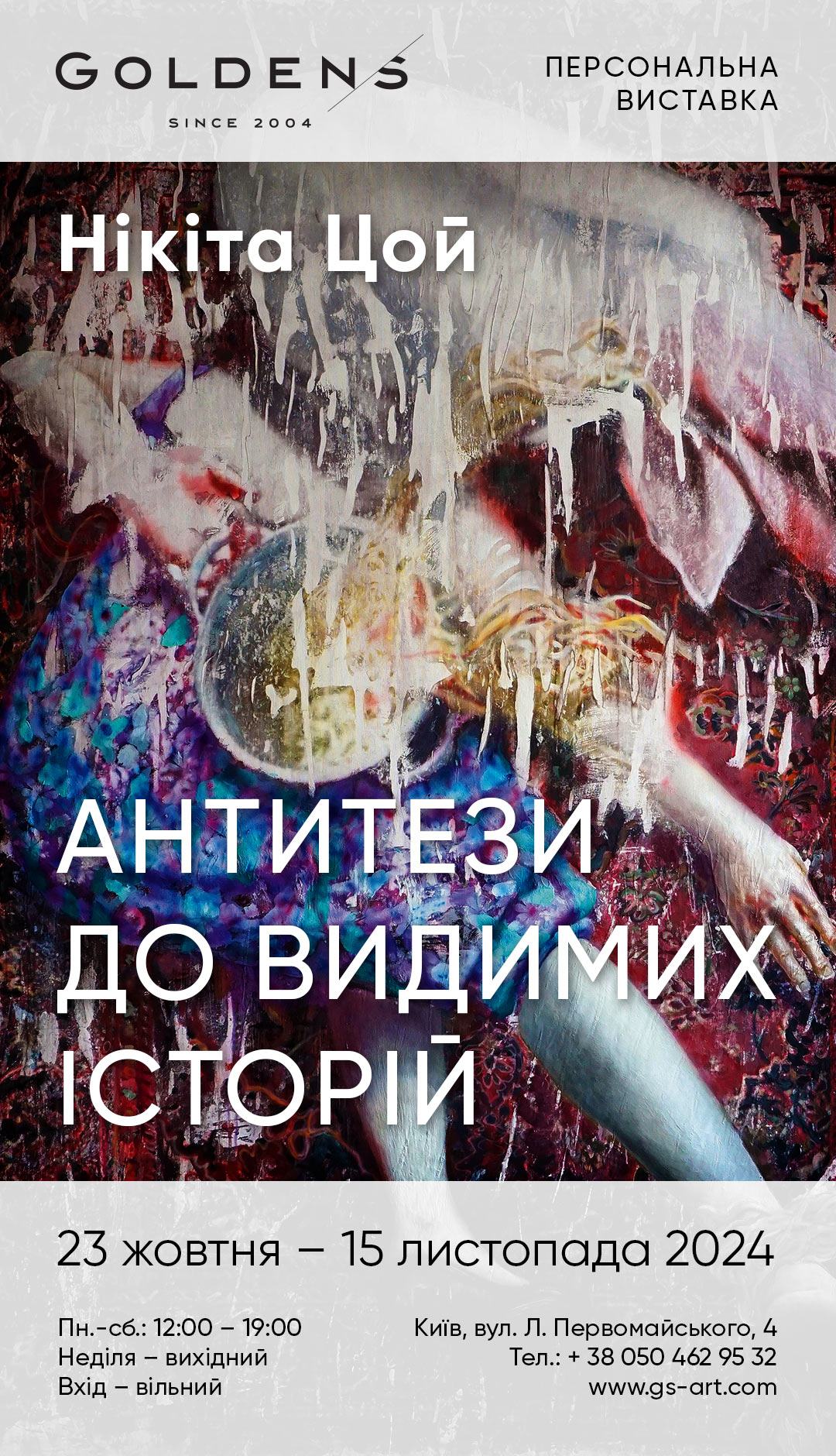
According to the artist, the antithesis of the visible real life of a person with its complex of stereotypical ideas formed by the environment is the possible existence of his or her deeply hidden second self, inherited from the subconscious – “these are, first of all, reflexes originating in our body and its experience, which are a counterweight to our EGO, which originates in moral and ethical virtues.”
In many of his paintings, Nikita Tsoi imitates the shadow of a camera flash, “feeling the desire of this shadow” to give reality to his unpredictable images. This use of the black shadows of the caravaggists helps, in his opinion, “to assemble the human body from the remnants of the environment and phenomena that have been ‘embedded’ in the person.” But it also brings mystical, even eschatological moods to his works.
Nikita Tsoi’s dynamic, boldly and skillfully painted characters balance between the worlds of realism, surrealism, expressionism, and symbolism, where their twisted, deformed, sometimes hyperbolic flesh is surrounded by either bizarre symbols or ordinary objects, and inscribed in the attributes of either supernatural situations or quite ordinary events.
These images are certainly allegorical, but they embody concepts that are not so easy to reveal.
By analyzing archetypes, rethinking them in a new way, combining the absurd and the incompatible, the artist finds and destroys the threshold between acceptance and rejection, admiration and denial, sarcasm and compassion, the horrible and the funny, the sublime and the mundane, the fantastic and the real.
Nikita Tsoi’s works evoke a complex set of emotional states in the viewer, which are quite difficult to understand. They encourage not only the expression of feelings, but also intellectual practice, in which the titles of the works often play an important role.
“Antitheses to Visible Stories” is a research project, the results of which can be completely unexpected. According to all the rules of the postmodernism game, which require direct participation from the viewer. Just like everything that happens in the strange, stunning, and truly unique world of Nikita Tsoi.
The project is represented by 15 paintings. The exhibition is open to the public from October 23 to November 15.
For more information about purchasing works included in the collection of the exhibition project Nikita Tsoi. Antitheses to Visible Stories”, please contact the specialists of Goldens auction house in the exhibition hall and in the online catalog by clicking the ‘Interested’ button.
Nikita Tsoi (b. 1991) is a Ukrainian artist. He was born in Kyiv. He grew up in a creative family where art was respected, so he developed his drawing skills in a creative environment and in conditions of freedom of expression. He began his career as an artist at the age of five and has been participating in exhibitions since the age of seven. He studied at the Kyiv Children’s Academy of Arts (1997-2006); Taras Shevchenko State Art School (2006-2010); National Academy of Fine Arts and Architecture (2010-2016), where he studied with M. Storozhenko; Kyiv Academy of Media Arts (2018-2019). Member of the National Union of Young Artists of Ukraine (2016). Lives and works in Kyiv.
Work schedule:
October 23 – November 15, 2024
12:00 – 19:00
Monday – Saturday
Sunday – day off
The entrance is free
Address:
Kyiv, 4 Leonid Pervomaisky str.
Goldens auction house
+ 38 050 462 95 32